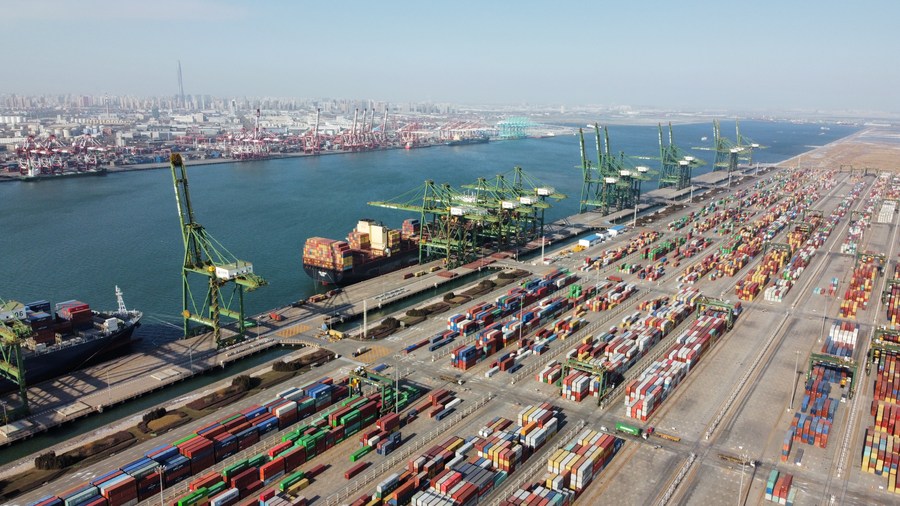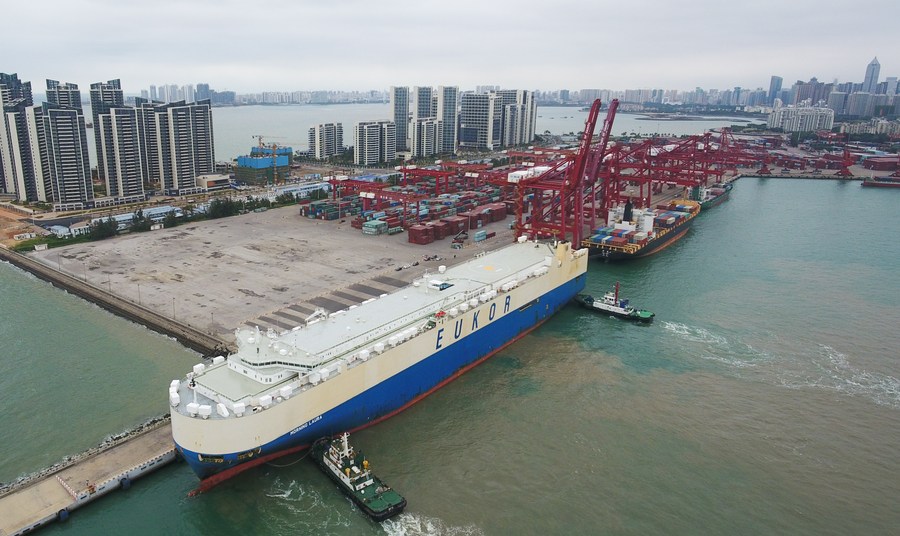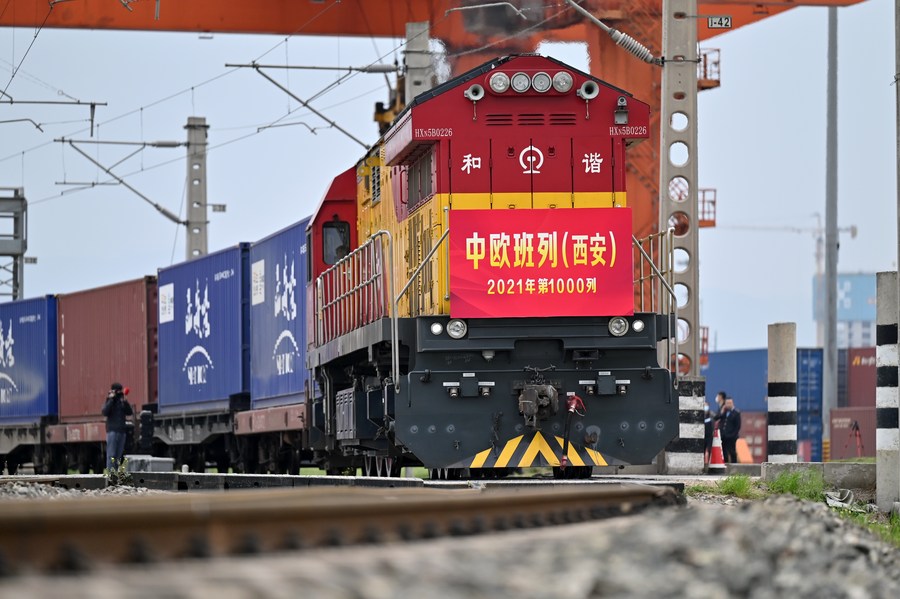Growbalization -- 20 years on since WTO accession, China globalizes growth for benefit of all
-- As Chinese President Xi Jinping said last month in his keynote speech at the opening ceremony of the fourth China International Import Expo (CIIE), China, over the last 20 years, "has kept opening wider to the world, thus generating a new wave of domestic development while injecting fresh impetus into the world economy."
-- More importantly, in light of China's bright prospects of development and firm commitment to opening-up and win-win cooperation, the great growth globalizer is well positioned to make greater contributions to what can be described as "growbalization."
-- China's accession to the WTO set a milestone in its epoch-making reform and opening-up, ushering in a new era that has witnessed the Asian country becoming an increasingly robust driver of economic globalization and an increasingly large contributor to global development.
-- China has been resolutely committed to upholding the multilateral trading regime with the WTO at its core, practicing true multilateralism, and supporting the inclusive development of the multilateral trading regime.
BEIJING, Dec. 11 (Xinhua) -- When France-based cosmetics giant L'Oreal entered China to test the waters 24 years ago, it started with opening a small office in Shanghai with only several employees.
That outpost has now grown into the North Asia headquarters of the world's biggest beauty company, employing about 10,000 people in China and boasting a portfolio of 25 brands.
The transformation of L'Oreal China is just one of the numerous illustrations of what China's opening-up means during the past decades, especially since the Asian country's 2001 accession to the World Trade Organization (WTO).
As Chinese President Xi Jinping said last month in his keynote speech at the opening ceremony of the fourth China International Import Expo (CIIE), China, over the last 20 years, "has kept opening wider to the world, thus generating a new wave of domestic development while injecting fresh impetus into the world economy."

People visit the 4th China International Import Expo (CIIE) in east China's Shanghai, Nov. 5, 2021. (Xinhua/Li Xiang)
Indeed, economists, trade experts and government officials worldwide have come to the conclusion that since its WTO accession, China has not only fulfilled its commitments, but also played a major role in energizing growth and development around the world.
More importantly, in light of China's bright prospects of development and firm commitment to opening-up and win-win cooperation, the great growth globalizer is well positioned to make greater contributions to what can be described as "growbalization."
HONORING WORDS WITH ACTIONS
"The WTO would not be the World Trade Organization without China," WTO Director-General Ngozi Okonjo-Iweala said at a recent high-level forum on the 20th anniversary of China's accession to the WTO.
On Nov. 10, 2001, the fourth WTO's Ministerial Conference approved China's entry into the world trade body. One month later, China officially became the WTO's 143rd member.

File photo shows Shi Guangsheng (L, front), then Chinese Minister of Foreign Trade and Economic Cooperation, celebrating with others after signing the protocol of China's accession to the World Trade Organization (WTO) on behalf of the Chinese government in Doha, Qatar, Nov. 11, 2001. China became a formal WTO member on Dec. 11, 2001. (Xinhua/Wang Jianhua)
China joining the WTO, commented Okonjo-Iweala, was nothing less than the completion of the largest trading bridge between China and the West since Marco Polo's expedition in the 13th century.
Speaking of that significant juncture, former WTO chief Supachai Panitchpakdi, also a former secretary-general of the United Nations Conference on Trade and Development, noted that China's accession commitments were the deepest and broadest among all WTO members.
Nonetheless, China has since devoted determined and Herculean efforts to deliver its promises. China is a prominent and active member of the WTO and has participated in "all elements of our work with enthusiasm and commitment," said WTO spokesperson Keith Rockwell, recalling that China was a fast learner after it became a member of the WTO in 2001.
For example, when it joined the WTO, China pledged to lower the import tariff for goods to 9.8 percent from 15.3 percent. Now its overall import tax stands at 7.4 percent, lower than the average level of developing members and close to the level of developed members.
In terms of trade in services, China pledged to open the market for 100 subsectors in nine business categories by 2007. It actually opened nearly 120 subsectors, around 20 percent more than it promised.
Meanwhile, during the past two decades, China's central government has reviewed and revised over 2,300 pieces of laws and regulations, and local governments over 190,000 pieces, which all helped to unleash market and social vitality.
With such concrete measures as rolling out the Foreign Investment Law and gradually shortening the foreign investment negative list, China has been going the extra mile to honor the WTO spirit and promote high-quality opening-up.
"Following its accession, China has fully accepted the prevailing international trade norms. China's international trade standards are in line with the legal system of the WTO," said Wang Jiangyu, a professor at the School of Law of City University of Hong Kong (CityU) and director of the Center for Chinese and Comparative Law.
"That means the international economic and trade legal regime is applied in China on a large scale, which is conducive to the unification of the global trading system," he told Xinhua.
"As a European company in China for over 30 years, we have witnessed China's continuous efforts to deepen opening-up and improve the business environment since its accession to the WTO," said Tony Wei, managing director of Swarovski's Business Services and Crystal Business in Greater China.
"We have full confidence in China's development and future," he added.
GLOBALIZING GROWTH, DEVELOPMENT
China's accession to the WTO set a milestone in its epoch-making reform and opening-up, ushering in a new era that has witnessed the Asian country becoming an increasingly robust driver of economic globalization and an increasingly large contributor to global development.
The past 20 years, Xi said in his recent CIIE speech, "have witnessed a China deepening reform and pursuing all-round opening up, a China seizing opportunities and rising to challenges, and a China stepping up to its responsibilities and benefiting the whole world."
In the eyes of Jeffrey Sachs, director of the Center for Sustainable Development at Columbia University, China's entry into the WTO was "a tremendous push to globalization." "Without (China's) membership in WTO," he told Xinhua, "a lot of economic growth and integration would not have taken place."
Over the last two decades, China's economic size has grown from the sixth to the second largest in the world, and its outbound direct investment has risen from the 26th to the first. It has been the largest contributor to global growth for 15 years running, and the world's second largest importer for 11 consecutive years.

Aerial photo taken on Jan. 11, 2021 shows a view of the Pacific international container terminal at Tianjin Port in north China's Tianjin Municipality. (Xinhua/Zhao Zishuo)
Meanwhile, China has now become the top trading partner of more than 50 countries and regions, and one of the top three trading partners of over 120 countries and regions. Since 2008, it has been the top destination of exports from the least developed countries.
On top of such growth-driving measures as the CIIE, the China International Fair for Trade in Services and the Canton Fair, the Belt and Road Initiative, proposed and championed by Xi, has become the world's broadest-based and largest platform for international cooperation, bringing development opportunities to countries and communities around the globe.

People visit the 2021 China International Fair for Trade in Services (CIFTIS) at Shougang Park in Beijing, capital of China, Sept. 6, 2021. (Xinhua/Xu Qin)
Mari Elka Pangestu, managing director of Development Policy and Partnerships in the World Bank, noted that thanks to efforts like promoting domestic reforms and widening market access for foreign investment, China's economic strength has kept growing, which has not only advanced its own development, but also brought benefits to its trading partners, including developing and the least developed countries.
"China not only provides a huge market for foreign goods, but also provides opportunities for the economic growth of these countries and employment opportunities for people in these countries," Zhang Rui, a professor of the Academy of China Open Economy Studies at Beijing-based University of International Business and Economics, told Xinhua, adding China has provided its wisdom for global economic governance.
China's WTO accession was an important step for its economic development and a milestone in globalization, said World Economic Forum President Borge Brende, noting that the doubling of the global GDP during the last decades is based on globalization.
"What China has introduced is a new form of 'globalization,' which is oriented toward the good of the people," said William Jones, Washington bureau chief of the U.S. publication Executive Intelligence Review.

Aerial photo taken on Feb. 16, 2020 shows roll-on-roll-off ship Morning Laura docking at the Xiuying Port, Haikou, capital of south China's Hainan Province, Feb. 16, 2020. Morning Laura is the first ship for automobile trade arriving at Hainan since Hainan free-trade zone policy took effect. (Xinhua/Yang Guanyu)
"The poverty alleviation campaign and the Belt and Road Initiative are paradigmatic for this new orientation," he told Xinhua. "This has raised hopes, particularly in the developing world, that the future will be brighter."
UPHOLDER OF MULTILATERAL REGIME
"As the COVID-19 pandemic continues to wreak havoc and the global economy faces a bumpy recovery, it is all the more imperative that people around the world pull together to tide over this difficult time."
Xi's call for international solidarity and cooperation is particularly relevant today, with the world experiencing the combined impacts of major changes and a pandemic both unseen in a century.
Amid resurging unilateralism and protectionism, studies show a steady decline of the World Openness Index over the past decade and a weakening of global consensus on opening-up.
Meanwhile, the global economy is also facing such great challenges as balancing the inflationary pressure and economic growth, tackling energy shortage, reducing CO2 emissions, reinforcing the global value chains, and enhancing infrastructure investments, noted Brende, urging world leaders to work together to find common solutions.
"As for China, we will not change our resolve to open wider at a high standard; we will not change our determination to share development opportunities with the rest of the world; and we will not change our commitment to an economic globalization that is more open, inclusive, balanced and beneficial for all," Xi declared.

A China-Europe freight train leaves Xi'an International Trade and Logistics Park in Xi'an, northwest China's Shaanxi Province, April 13, 2021. (Xinhua/Li Yibo)
China has been resolutely committed to upholding the multilateral trading regime with the WTO at its core, practicing true multilateralism, and supporting the inclusive development of the multilateral trading regime.
Commenting on Western accusations that China is not abiding by the WTO rules, Wang, the CityU professor, said that those allegations are actually special rhetoric designed to construct a wrongful image of China, and those Western countries, through this approach, attempt to gain the upper hand in the international engagement with China.
On the other hand, the WTO regime is never perfect, with no detailed or updated rules covering some specific issues such as state-owned enterprises and e-commerce, so it is "without legal basis" to blast China on those fronts, he added.
"What should be done is that all WTO members sit down and discuss together relevant rules and regulations," he said, stressing that it is not right for some members to exclude China first and then formulate a set of rules on their own and impose those rules on others.
Noting that China's WTO accession has proved that it is a strong believer in a multilateral system, Brende pointed out that China is committed to removing trade barriers and obstacles, and works to build a strong multilateral trading regime.
"China is a big supporter of multilateral systems," echoed Sachs. "And this is exactly what we need right now."
Photos
Related Stories
- Toward a better future -- Xi Jinping and the evolving 143rd WTO member
- Persistent opening-up best manifestation of China's WTO commitment
- Nation marks 20th anniversary of joining WTO
- China a significant contributor to WTO negotiations on services domestic regulation: MOC
- China is prominent, active member of WTO, says WTO spokesperson
Copyright © 2021 People's Daily Online. All Rights Reserved.










